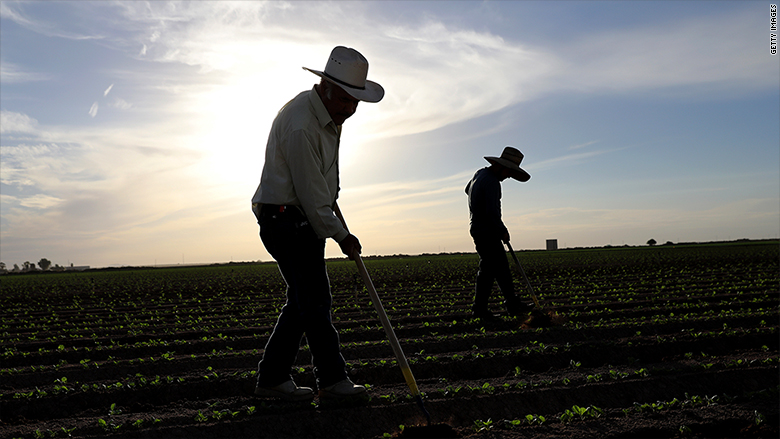
California is pushing forward with legislation to become the nation's first "sanctuary state."
If passed, the bill would prohibit state and local law enforcement agencies from detaining or arresting an undocumented immigrant for federal immigration enforcement purposes. Without a warrant, local officers would refrain from holding someone who overstayed their visa for federal immigration authorities, for example.
Lawmakers are not only seeking to protect the state's estimated two to three million undocumented immigrants, but also to defend a valuable economic engine.
"California's undocumented immigrant population is critical to the state's economic success," said senator Kevin de León, who introduced the bill to California's state senate. "That workforce contributes some $180 billion to the state's GDP."
Related: Home builders cant find enough workers
Nearly one out of every 10 workers in California is undocumented, according to the Public Policy Institute of California, a nonpartisan research group. And these workers often take on jobs that U.S.-born workers typically don't fill in fields like agriculture, construction and manufacturing, experts say.
Related: The worker shortage facing America's farmers
Agricultural workers in particular have become a major backbone of the state's economy. In 2015, California's 76,000 farms and ranches sold $47 billion worth of agricultural products, according to the California Department of Food and Agriculture.
"We would not be the sixth largest economy in the world if not for our immigrant labor force," said California State Controller, Betty Yee. "Our state's economic health relies on the contributions of all Californians."

Not only do California's undocumented workers fill jobs, but they pay taxes too.
In 2014, almost $3.2 billion of California's state and local taxes came from undocumented immigrants, according to the Institute on Taxation and Economic Policy, a Washington D.C.-based research group.
Related: Why undocumented immigrants pay taxes
Laura Hill, senior fellow at California's Public Policy Institute, said a statewide sanctuary policy would help keep California's economy stable because it would help keep undocumented residents from retreating back into the shadows for fear of being deported.
The Public Policy institute has surveyed Californians four times since 2016 on whether there should be a way for undocumented immigrants to stay in the country legally if certain requirements are met. Each time, 82% or more of residents have supported this idea, Hill said.
But not everyone agrees on the sanctuary state bill. In a letter it sent to the state's senate in March, the California State Sheriffs' Association said that although it doesn't want its officers to act as immigration officers, it believes that California's pursuit of sanctuary status puts potentially dangerous people back on the streets.
The group also said it worries that federal funding for law enforcement programs would be jeopardized should California implement sanctuary policies.
Both President Trump and U.S. Attorney Jeff Sessions have vowed to block federal funds from sanctuary jurisdictions that fail to cooperate with federal immigration enforcement. In the cross hairs are federal funds for local law enforcement agencies within these sanctuary cities or states.
Related: What sanctuary cities stand to lose
The state of California expects to receive $107 billion from the federal government in the upcoming fiscal year, about $20 million of which is earmarked for local law enforcement, said H.D. Palmer, spokesman for the California Department of Finance.
"Even though that figure is fairly small relative to the overall budget, they are important funds to these communities," Palmer said.
In April, the 9th circuit court of appeals blocked the Trump administration from withholding federal funds from sanctuary cities. The court still needs to deliver a final ruling on the case. However, the Trump administration has vowed to take this to the U.S. Supreme Court if necessary.
Evan Westrup, a spokesman for California Governor Jerry Brown would not comment on the pending sanctuary state legislation or the federal funds that might be at risk.
The sanctuary state bill still needs to go through committee hearings before it will reach a final vote in the coming months.


